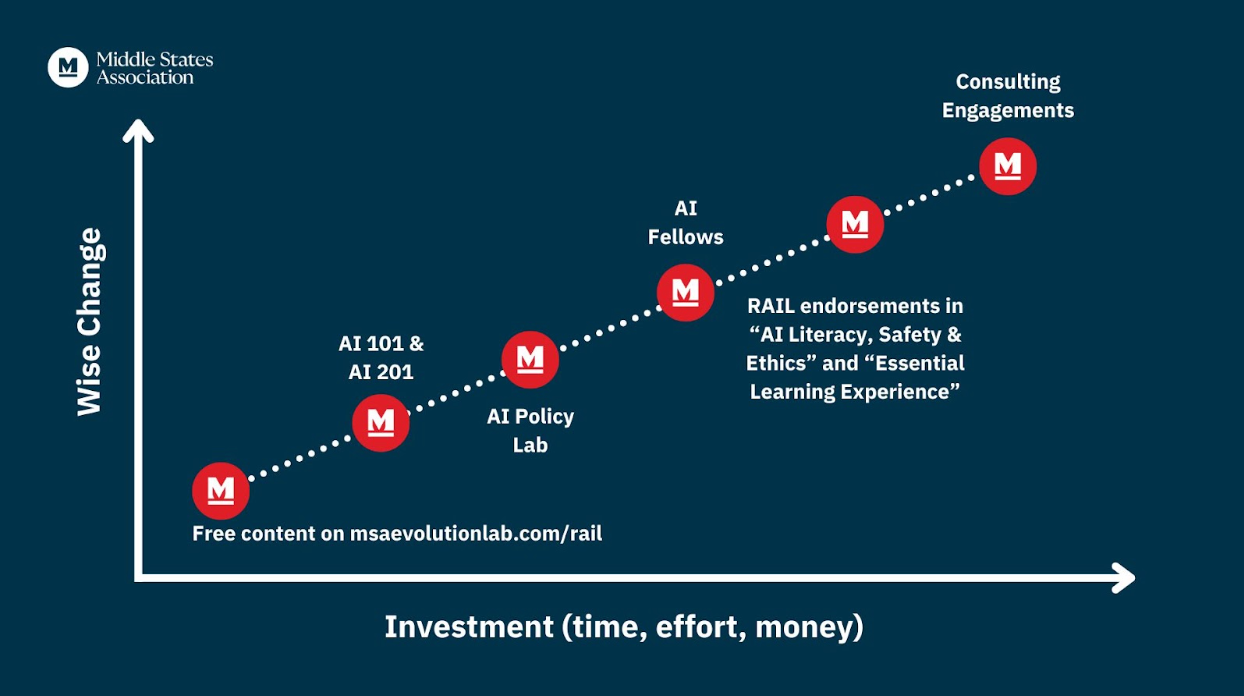Emerging from Stealth Mode: Middle States AI Fellows
Written By: Christian Talbot, President & CEO of the Middle States Association | Published September 21st, 2025
What if you aren’t ready for a full school commitment to AI?
What do you do when only a few teachers are ready to lead the way?
We have been working in stealth mode on something new to help schools adopt AI responsibly. It is an implementation framework that doubles as a community of practice.
We call it AI Fellows.
To understand why it matters, consider this metaphor from Tim Dasey: AI implementation efforts in K12 schools is like attempting to trigger a chemical reaction by adding more heat:
“Many leaders would jump straight from educating about AI to policies and rollout plans, or maybe they did that before they knew what they were doing. They’re pushing by adding heat to the ‘reactions.’ [...] What’s needed instead are selective barrier reductions through catalysts.” (emphasis added)
Just as catalysts reduce the amount of energy required for a chemical reaction to occur, eliminating obstacles increases the likelihood that teachers will adopt AI.
What does that look like in practice? Dasey names several “catalysts” for school leaders to try. Here are just a few:
Protected time and space for investigations (eg, duty exemptions or collaboration periods for participating teachers).
Class coverage so that teachers can observe each other using AI.
Safe-to-fail investigations that focus on learning what works rather than knowing what works (because there are no AI best practices yet–only effective and promising practices).
Once catalysts have reduced or eliminated barriers, teachers are liberated to investigate AI. through a few simple but powerful questions:
What learning problem or opportunity am I trying to address with AI? How can AI help?
What do I think will happen when AI is introduced?
What actually happened? (Especially what happened that I didn’t expect?)
What would I do differently next time?
These questions form the core of action research. And action research forms the core of the AI Fellows program.
The program emerged as a solution to a need for “speedboats”: In spring 2025, leaders from Fordham Prep approached Middle States and asked if we could design something that would allow early adopters to quickly implement AI tools in service of powerful learning experiences.
Since then, we have been piloting with teachers from Fordham Prep, the Loyola School (NYC), Kellenberg High School, and Regis High School. Joining us in that facilitation is Dr. Ericka Rovira, Professor of Engineering Psychology at West Point.
The AI Fellows implementation framework is focused and simple:
Deploy “catalysts.” Each school agreed up front to lower barriers and remove obstacles to liberate their AI Fellows to conduct action research on AI.
Design for powerful learning. Each AI Fellow has drafted a “Declaration of Powerful Learning,” a one-page definition and description of the most powerful forms of learning in that teacher’s classroom.
Align AI action research with powerful learning. AI Fellows then created action research plans to investigate a problem or opportunity related to a powerful learning experience.
Learn in public. Dr. Rovira and I meet every few weeks with AI Fellows as a group. We all share feedback on their works-in-progress and pose questions. Between meetings, AI Fellows update their activity in a shared digital space.
Build-Test-Learn-Iterate. Dr. Rovira has designed pre- and post-evaluations for each action research project so that we have data to gauge effectiveness and the AI Fellows can adjust their approaches accordingly.
As Tim Dasey writes, “Leaders who [reduce or eliminate obstacles] won’t just successfully integrate AI—they’ll build educational institutions capable of continuous adaptation. They’ll create competitive advantages that persist beyond any single technology transition. Most importantly, they’ll serve students by preparing them for a world where learning and adapting quickly is essential.”
AI Fellows is our latest implementation framework to help schools clear obstacles and catalyze action. What moves is your school making to prepare students for our world of increasingly abundant AI?
Middle States offers AI implementation frameworks at all scales. Want to explore one of them? Email us at rail@msa-cess.org.

